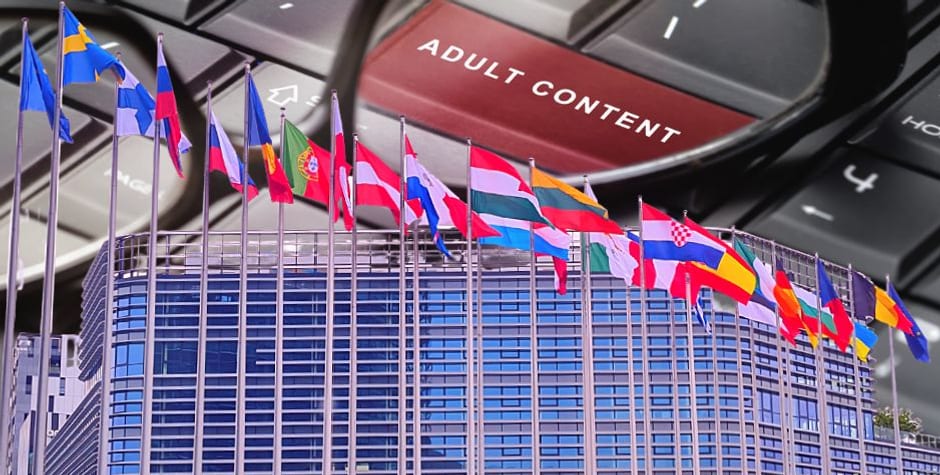As the European Parliament prepares to vote on the revision of the 2011 European directive on trafficking in human beings, Priscille Kulczyk, research fellow at the European Centre for Law and Justice (ECLJ), is concerned about the absence of any reference to pornography in the current version of the text.
(Op-ed originally published in French, in Le Figaro Vox, 22 June 2023)
The European Parliament is working on a new revision of the reference instrument for combating human trafficking in Europe. In 2002, this text stated that “Each Member State shall take the necessary measures” to punish offences concerning trafficking in human beings “for the purpose of the exploitation of the prostitution of others or other forms of sexual exploitation, including in pornography”. In 2011, it was replaced by a European directive in which the reference to pornography was removed, as if the trafficking of women and children did no longer fuel pornography in Europe.
A revision of this directive is currently being examined by the European Parliament, which ought to take the opportunity to reinstate an explicit reference to sexual exploitation in pornography. This is necessary because the phenomenon is far from marginal, as shown by recent cases in which dozens of victims are suing those who exploited them to produce pornographic content or have already had them convicted.
Pornography and human trafficking: an unhappy marriage
This type of sexual exploitation is a relatively unknown but no less widespread form of human trafficking and is regularly reported in the press. In September 2022, the French Senate also published an information report with the evocative title “Porno, l’enfer du décor” (Porn, the hell of the setting), denouncing the abuses in the practices of the pornographic industry. On the other hand, and more generally, since supply and demand for pornography rose sharply during the covid-19 pandemic, this has led to an increase in trafficking, as noted, in particular, by United Nations bodies.
Pornography can even be described as the “hub” of human trafficking. On the one hand, pornography is fueled by trafficking. In France, for example, the “French Bukkake” case concerns about fifty victims of pornographic producers and actors who have been charged with aggravated human trafficking. These young women, most of whom were vulnerable and financially in need, were lured via a false young woman’s account on social networks, then recruited to act in X-rated films involving violent and humiliating practices, sometimes after being drugged. Similarly, in the “GirlsDoPorn” case, several people are accused of sex trafficking: young women responded to an advert for modelling but, once on site, were forced to shoot pornographic scenes under threat of legal action, cancellation of their return flight or publication of extracts from videos already filmed. Some were also sequestered. In June 2022, the founder of the Jacquie et Michel group was also charged with human trafficking.
On the other hand, like the other side of the coin, pornography also fuels trafficking because it has close links with prostitution and pimping. They have in common the renting of bodies, in exchange for money, for the satisfaction of others. While it is not uncommon for pornographic actresses to prostitute themselves or to have been prostituted in the past, some practices are close to both prostitution and pornography. This is the case with “camgirls” who offer sexual acts via webcam. In the “French Bukkake” case, it is interesting to note that some of the defendants are also charged with “aggravated pimping”. In addition, it is not unusual for pornography consumers to turn to prostitutes to reproduce what they have seen on screen.
Pornography and human trafficking: a link to be reaffirmed at the European level
There are texts from international organisations that expressly establish the link between pornography and trafficking in human beings, but they remain relatively rare. That is why, in the light of the unequivocal facts, it seems essential to reaffirm this link, particularly at the European level. Explicitly referring to sexual exploitation in the context of pornography is even more appropriate as it is fully in line with the objectives underlying the current revision of the Directive on trafficking in human beings. Indeed, the European Commission is concerned about the increasing number of offences committed or facilitated by means of information or communication technologies and the use of these technologies to widely share exploitative material. It therefore wishes to address the online dimension of trafficking in human beings, so as to more generally enhance the victims’ protection, support and reintegration.
The facts and the victims’ testimonies prove that explicitly mentioning sexual exploitation in pornography is an imperative need that even supporters of normalising “sex work” should bow to. The revision of the European directive on trafficking in human beings offers MEPs an excellent opportunity to combat this crime, which benefits the pornography industry. In the name of respect for human dignity and equality between women and men, it is their duty to seize this opportunity.













